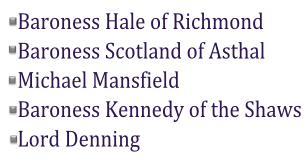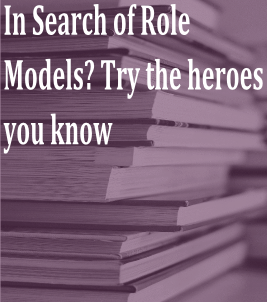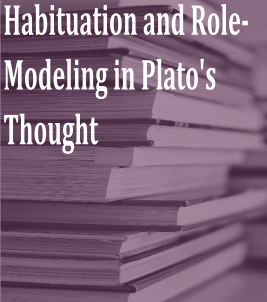![]()
A person who provides a positive influence for others is defined as a role model. A role model is an individual:


In all professions, trainees are inspired by role models, generally their senior. Sometimes these are the mentors who support them as they enter practice, or they might be other significant individuals who have a formative effect on them during training.
Trainees in the law often report that they learn how to behave ethically in the legal profession from these role models. In this section, you will learn about the positive effect that role models can have in your professional lives.
![]()
Inspiration can come from anywhere, but some people in our lives make a lasting contribution towards creating a better world for us and others. These people may have inspired others through their various achievements but also their attitude and virtues.
![]()
Think about the people in your professional life who inspire you. For each person, highlight five positive character strengths they possess and discuss on the discussion boards. Beyond your immediate family, who else has demonstrated these character strengths? Are these character strengths often  demonstrated in formal and informal settings?
demonstrated in formal and informal settings?
Discuss with your fellow learners.
![]()
Sometimes, NEGATIVE role models shape who you are. They may help you realise who you do NOT want to be, or how you do NOT want to act. In small groups, discuss some of the negative character strengths, or vices, that you may have witnessed in other people and how they may have influenced your  professional practice.
professional practice.
Discuss on the discussion boards.
![]()
Do you consider yourself to be a role model to anyone else in the workplace? Think about who might regard you as a role model. What might they learn from you? If you have not previously thought of yourself as a role model to others, does thinking of yourself as one change your behaviour in any way? Discuss in small groups.
![]()
Listed below are a number of high profile lawyers. Identify what you consider to be their top 5 character strengths and state why they may be considered to be role models.

![]()
In small groups, discuss whether all lawyers should be considered as de-facto role models. Look at the following examples and, in each case, consider to what extent they have set a positive example and acted as role models for their profession:
- Sir Sydney Kentridge KC – eminent South African lawyer and English QC. Kentridge acted for the family of the activist Steve Biko at the inquest into his death in detention in 1977. Watch this video:
- Lt Col. Yvonne Bradley – practising lawyer and Judge Advocate General’s (JAG) Advocate at Guantanamo Bay trials. Lt. Col. Bradley took a stand relating to procedural rules in relation to the access to and handling of evidence and the potential for a breach of confidentiality and conflicts of interest to arise. Read her interview with students at Columbia University in 2011 where she talks about her career;
- Robert Kennedy – former US Attorney General and brother of President John F. Kennedy. Robert Kennedy was a practising lawyer and an advocate of the Civil Rights Movement in the USA. At the Dedication of Kendrick Hall, University of San Francisco Law School, in 1962, Kennedy urged the legal profession in the US to actively promote civil rights, giving examples from virtuous acts of famous lawyers in past times. Consider Kennedy’s own comments and also the actions of the lawyers he cites in his address.
- Sophie Scholl and her colleagues in the White Rose Group. Listen to this broadcast from the BBC World Service. Read this note on the website of the University of Munich.
![]()
 | |
Mark Hyatt – this is a blog piece written for the Jubilee Centre for Character and Virtues by the then CEO of Character Education Partnership (now character.org). The piece looks at role modelling in developing young people’s character, and the importance of using combinations of aspirational figures from society and adults who provide support and motivation on a personal level. | Mark Jonas – This paper promotes Plato’s ethics as a resource for theorists and educators who seek to develop a robust approach to character education. It is argued that Plato’s educational project adds to Aristotle’s in an important way by offering an educational framework in which students who missed the proper habituation and role modelling in their early educations could develop the desire and discipline to pursue habituation and role modelling in their later educations. |






